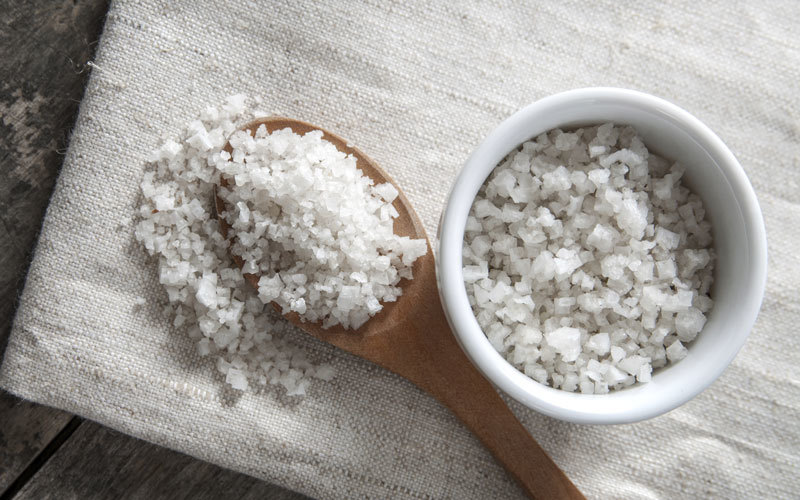As the world moves toward cleaner, more holistic living, the foods we consume are also undergoing a transformation. People are shifting away from heavily processed ingredients and embracing more natural, nutrient-dense alternatives. Celtic Sea Salt has gained attention for its health benefits and rich mineral profile. But why is this particular salt gaining popularity, and what makes it stand out among other salts?
In this blog, we will explore the 4 key benefits of Celtic Sea Salt, how it supports overall health, and some important considerations to keep in mind.
Understanding Celtic Sea Salt: A Mineral-Rich Treasure

Celtic Sea Salt is more than just a seasoning—it’s a nutrient powerhouse. Harvested from the coastal regions of Brittany, France, using ancient techniques, this salt retains a unique mineral profile that highly refined table salts lack. The traditional process involves evaporating seawater in clay ponds, allowing the salt to absorb essential minerals from both the earth and seawater. This method ensures that Celtic Sea Salt remains rich in trace minerals, including magnesium, calcium, potassium, and more.
Unlike refined table salt, which is typically stripped of its beneficial minerals, Celtic Sea Salt provides these vital nutrients to support various bodily functions, especially hydration and digestive health.
Why Salt is Essential for Your Body
The Role of Salt in Human Physiology
Salt is a critical component in maintaining several bodily functions, such as:
- Fluid Balance: Sodium helps regulate the body’s water levels, ensuring optimal hydration.
- Electrolyte Balance: Sodium, potassium, and calcium work together to regulate muscle contractions and nerve function.
- Cellular Communication: Salt helps cells exchange nutrients and waste, promoting overall cellular function.
However, the type of salt you consume is just as important as the amount. Refined salts, which contain only sodium chloride, can contribute to health issues like high blood pressure, kidney damage, and fluid retention. In contrast, Celtic Sea Salt provides a broader spectrum of electrolytes and trace minerals, making it a healthier choice for maintaining hydration, better muscle function, and overall well-being.
4 Key Benefits of Celtic Sea Salt
1. Supports Hydration and Electrolyte Balance
Celtic Sea Salt is an excellent source of magnesium, which helps regulate hydration and fluid balance. Magnesium plays a crucial role in ensuring that your body retains the necessary fluids for optimal function, especially during physical activity or in hot weather.
By adding a pinch of Celtic Sea Salt to your water or meals, you can enhance your hydration efforts and promote better fluid absorption. This can help reduce the risk of muscle cramps, fatigue, and dehydration.
2. Enhances Adrenal and Hormonal Health
The adrenal glands play a pivotal role in managing stress and regulating hormones like cortisol. During stressful periods, our adrenal glands require higher amounts of magnesium and other electrolytes to function effectively.
Celtic Sea Salt can replenish these essential nutrients, supporting adrenal health and reducing the impact of stress on the body. It also helps balance electrolyte levels, which supports thyroid function and improves blood pressure regulation, two critical aspects of hormonal health.
3. Improves Digestive Health
A healthy gut depends on the balance of digestive enzymes, which break down food and promote nutrient absorption. Celtic Sea Salt stimulates the production of these enzymes, improving digestion and overall gut health.
This salt can also help alleviate common digestive issues, such as acidity, bloating, and flatulence, especially when combined with a balanced diet. Moreover, it promotes the production of hydrochloric acid, which is vital for protein digestion.
4. Aids in Skin and Bone Health
The magnesium and calcium content in Celtic Sea Salt are crucial for bone health and skin vitality. Magnesium helps in bone formation, while calcium supports bone density. Additionally, magnesium’s anti-inflammatory properties can reduce the risk of skin conditions such as acne, eczema, and psoriasis.
Regular consumption of Celtic Sea Salt can contribute to stronger bones and healthier skin, offering a natural, holistic approach to improving your health and appearance.
How to Use Celtic Sea Salt in Your Daily Routine
Incorporating Celtic Sea Salt into your diet is simple and can be done in several ways:
1. Sole Solution: A Natural Mineral Boost
A popular way to consume Celtic Sea Salt is by preparing a Sole solution—a saltwater drink fully saturated with minerals. Drinking Sole water helps improve hydration, balance electrolytes, and support digestion.
How to prepare Sole Solution:
- Fill a glass jar one-third of the way with Celtic Sea Salt crystals.
- Fill the rest of the jar with filtered water.
- Seal the jar and let it sit for 24 hours to fully dissolve the salt.
- Once dissolved, add more crystals if needed until the water is saturated.
- Take 1/2 teaspoon of Sole solution mixed with a glass of water in the morning for a mineral boost.
2. Sprinkle on Your Meals
Use Celtic Sea Salt as a flavor enhancer for soups, salads, roasted vegetables, or even on your morning eggs. It can replace regular table salt while offering your body essential minerals.
3. Add to Your Water
A pinch of Celtic Sea Salt added to your drinking water is an easy way to replenish electrolytes, especially during or after a workout. It’s a great way to stay hydrated and support muscle function.
4. Use in Bath Soaks
For its therapeutic benefits, Celtic Sea Salt can be added to your bathwater. Magnesium, found abundantly in Celtic Sea Salt, is known to relax muscles and soothe sore joints, promoting relaxation and stress reduction.
Celtic Sea Salt vs. Other Salts
While both Himalayan Pink Salt and Celtic Sea Salt are unrefined and contain essential minerals, there are key differences in their mineral composition:
- Celtic Sea Salt is particularly high in magnesium, making it ideal for hydration, muscle health, and digestive support.
- Himalayan Pink Salt contains higher levels of iron, which is beneficial for boosting hemoglobin levels and combating anemia.
Ultimately, the choice between the two depends on individual health needs, but both offer superior benefits over refined salt.
Cautions and Drawbacks
While Celtic Sea Salt is a healthful option compared to refined salt, it’s important to be mindful of the following:
- Moderation: Like all salts, Celtic Sea Salt should be consumed in moderation. Too much sodium, even from natural sources, can contribute to high blood pressure and increase the risk of cardiovascular disease.
- Sodium Sensitivity: Individuals with conditions like hypertension or kidney disease should be cautious with salt intake, even natural salts like Celtic Sea Salt. Always consult with a healthcare professional if you have concerns about your sodium intake.
- Not a Cure-All: While Celtic Sea Salt offers numerous health benefits, it’s important to remember that it should be part of a balanced diet and healthy lifestyle, not a standalone remedy. Overreliance on salt for health benefits can lead to imbalances in other nutrients.
- Potential for Contamination: As with all sea salts, ensure that the Celtic Sea Salt you purchase comes from a reputable source to avoid contamination with heavy metals or microplastics. Always opt for organic, high-quality brands.
Conclusion: Why You Should Choose Celtic Sea Salt
Celtic Sea Salt is a nutrient-dense mineral source that supports hydration, digestive health, adrenal function, and overall well-being. Its rich magnesium content and other trace minerals make it an excellent alternative to refined salts, offering holistic health benefits.
Whether you use it in a Sole solution, sprinkle it on your meals, or add it to your bath for relaxation, Celtic Sea Salt can improve your overall health and well-being. Remember to use it in moderation, as part of a balanced diet, and enjoy the natural mineral boost it provides.
So, the next time you’re in the kitchen, consider swapping out regular salt for Celtic Sea Salt—your body and your taste buds will thank you.
References:
- Laires, M. J., & Silva, J. P. (2016). Magnesium and health. Journal of the American College of Nutrition, 35(1), 41-44.
- Fenton, T. R., & Huang, T. (2019). The role of electrolytes in hydration: Implications for exercise. Nutrition Reviews, 77(5), 349-361.
- National Institutes of Health. (2023). Magnesium: Fact sheet for health professionals. U.S. Department of Health & Human Services.
- American Heart Association. (2021). The facts about salt and sodium. AHA Website.
- Luke Coutinho. (2024). 4 Surprising Reasons Why Celtic Sea Salt Deserves a Place in Your Kitchen. LukeCoutinho Wellness.



